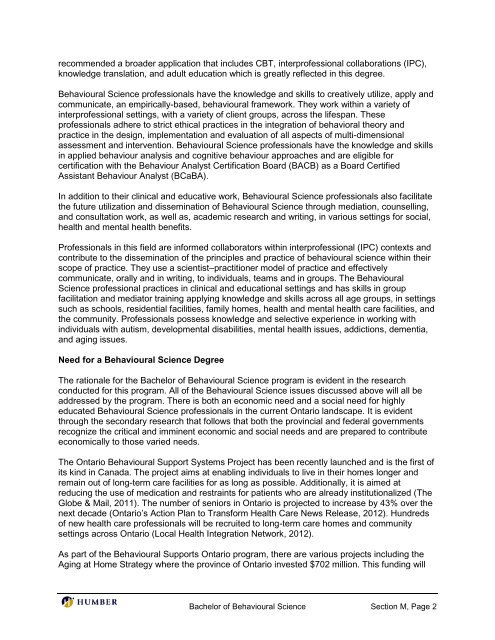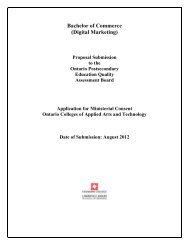Bachelor of Behavioural Science - Postsecondary Education Quality ...
Bachelor of Behavioural Science - Postsecondary Education Quality ...
Bachelor of Behavioural Science - Postsecondary Education Quality ...
You also want an ePaper? Increase the reach of your titles
YUMPU automatically turns print PDFs into web optimized ePapers that Google loves.
ecommended a broader application that includes CBT, interpr<strong>of</strong>essional collaborations (IPC),<br />
knowledge translation, and adult education which is greatly reflected in this degree.<br />
<strong>Behavioural</strong> <strong>Science</strong> pr<strong>of</strong>essionals have the knowledge and skills to creatively utilize, apply and<br />
communicate, an empirically-based, behavioural framework. They work within a variety <strong>of</strong><br />
interpr<strong>of</strong>essional settings, with a variety <strong>of</strong> client groups, across the lifespan. These<br />
pr<strong>of</strong>essionals adhere to strict ethical practices in the integration <strong>of</strong> behavioral theory and<br />
practice in the design, implementation and evaluation <strong>of</strong> all aspects <strong>of</strong> multi-dimensional<br />
assessment and intervention. <strong>Behavioural</strong> <strong>Science</strong> pr<strong>of</strong>essionals have the knowledge and skills<br />
in applied behaviour analysis and cognitive behaviour approaches and are eligible for<br />
certification with the Behaviour Analyst Certification Board (BACB) as a Board Certified<br />
Assistant Behaviour Analyst (BCaBA).<br />
In addition to their clinical and educative work, <strong>Behavioural</strong> <strong>Science</strong> pr<strong>of</strong>essionals also facilitate<br />
the future utilization and dissemination <strong>of</strong> <strong>Behavioural</strong> <strong>Science</strong> through mediation, counselling,<br />
and consultation work, as well as, academic research and writing, in various settings for social,<br />
health and mental health benefits.<br />
Pr<strong>of</strong>essionals in this field are informed collaborators within interpr<strong>of</strong>essional (IPC) contexts and<br />
contribute to the dissemination <strong>of</strong> the principles and practice <strong>of</strong> behavioural science within their<br />
scope <strong>of</strong> practice. They use a scientist–practitioner model <strong>of</strong> practice and effectively<br />
communicate, orally and in writing, to individuals, teams and in groups. The <strong>Behavioural</strong><br />
<strong>Science</strong> pr<strong>of</strong>essional practices in clinical and educational settings and has skills in group<br />
facilitation and mediator training applying knowledge and skills across all age groups, in settings<br />
such as schools, residential facilities, family homes, health and mental health care facilities, and<br />
the community. Pr<strong>of</strong>essionals possess knowledge and selective experience in working with<br />
individuals with autism, developmental disabilities, mental health issues, addictions, dementia,<br />
and aging issues.<br />
Need for a <strong>Behavioural</strong> <strong>Science</strong> Degree<br />
The rationale for the <strong>Bachelor</strong> <strong>of</strong> <strong>Behavioural</strong> <strong>Science</strong> program is evident in the research<br />
conducted for this program. All <strong>of</strong> the <strong>Behavioural</strong> <strong>Science</strong> issues discussed above will all be<br />
addressed by the program. There is both an economic need and a social need for highly<br />
educated <strong>Behavioural</strong> <strong>Science</strong> pr<strong>of</strong>essionals in the current Ontario landscape. It is evident<br />
through the secondary research that follows that both the provincial and federal governments<br />
recognize the critical and imminent economic and social needs and are prepared to contribute<br />
economically to those varied needs.<br />
The Ontario <strong>Behavioural</strong> Support Systems Project has been recently launched and is the first <strong>of</strong><br />
its kind in Canada. The project aims at enabling individuals to live in their homes longer and<br />
remain out <strong>of</strong> long-term care facilities for as long as possible. Additionally, it is aimed at<br />
reducing the use <strong>of</strong> medication and restraints for patients who are already institutionalized (The<br />
Globe & Mail, 2011). The number <strong>of</strong> seniors in Ontario is projected to increase by 43% over the<br />
next decade (Ontario‟s Action Plan to Transform Health Care News Release, 2012). Hundreds<br />
<strong>of</strong> new health care pr<strong>of</strong>essionals will be recruited to long-term care homes and community<br />
settings across Ontario (Local Health Integration Network, 2012).<br />
As part <strong>of</strong> the <strong>Behavioural</strong> Supports Ontario program, there are various projects including the<br />
Aging at Home Strategy where the province <strong>of</strong> Ontario invested $702 million. This funding will<br />
<strong>Bachelor</strong> <strong>of</strong> <strong>Behavioural</strong> <strong>Science</strong> Section M, Page 2
















